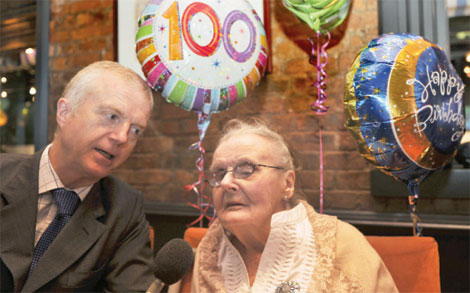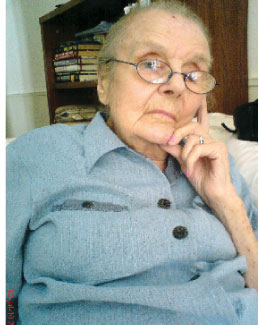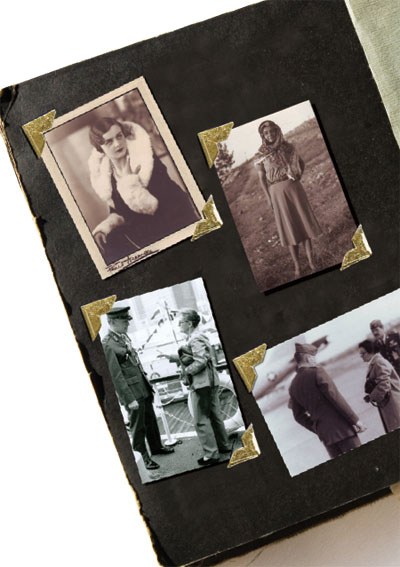Heroine of the headlines
Updated: 2011-10-12 07:16
By Simon Parry(HK Edition)
|
|||||||||
|
Clare Hollingworth (right) listens to British Consul-General Andrew Seaton while celebrating her 100th birthday at a party at the Foreign Correspondents' Club on Monday. The centenarian was joined by about 150 journalists and friends at a party at the club, where she has been a regular in the past three decades since moving to the city in 1981. Laurent Fievet / AFP |
Hong Kong's most celebrated foreign correspondent, Clare Hollingworth, marked her 100th birthday on Monday. Her extraordinary life is a lesson to young journalists everywhere and a potent demonstration of the power of good reporting, writes Simon Parry.
When she went tobed on Sunday, the night before her 100th birthday, Hong Kong's best-known foreign correspondent made sure two things were in their place before she switched off the light: A passport on her dressing table and a pair of sensible shoes beside her bed.
It is a ritual Briton Clare Hollingworth repeats every night. "Even though she's no longer working, old habits die hard," said her great nephew, Patrick Garrett.
"She still sleeps with her passport on her dresser beside her and her shoes beside her bed in case she is called away in the middle of the night on a story. Her maid tells me she always checks the passport is there before she puts the light out."
This week, as she turned 100, friends, family and dignitaries are toasting the remarkable life of Hollingworth - a Hong Kong resident for the past 30 years - whose career in journalism is in many ways a microcosm of 20th century world history, or at least its bloodiest and most dangerous bits.
Born on the day that China's imperial era ended, Hollingworth had been a reporter for a decade when the People's Republic was founded, Garrett points out, and is five years older than the historic building of the Foreign Correspondents Club (FCC), her spiritual home.
As a rookie 27-year-old reporter with Britain's Daily Telegraph, Hollingworth famously broke the story about the Nazi invasion of Poland that started the World War II. In the decades that followed she reported fearlessly from crises in the Balkans Africa, and later from Vietnam and China.
|
Clare Hollingworth, Hong Kong's most celebrated foreign correspondent, who turned 100 on Monday. Photo by Red Door News, Hong Kong |
For years, wherever there was trouble in the world, diminutive Hollingworth was there, striding like a storybook heroine into and beyond front lines, grittily determined to get the story whatever the personal dangers. Sometimes those dangers were extreme and life-threatening.
In Hong Kong, long after her last newspaper assignment, she would check in daily with the Daily Telegraph's foreign desk. And the passport on her dressing table is evidence that she has never really come to terms with retirement.
Bird-like in frame and with a penchant for champagne and caviar, Hollingworth lives in a flat close to the FCC where she is almost part of the fixtures and fittings. Her eyesight and memory are now failing but she keeps up with world events through the BBC World Service and by having newspapers read to her.
Far from a relic of a bygone, colonial age, her life has been an inspiration for a generation of young Hong Kong journalists, Garrett believes, as well as a powerful lesson in how good reporting can play a crucial role in the understanding of world events.
Hollingworth gives the most vivid description of her greatest scoop in a good-humored 1999 interview for the BBC radio show Desert Island Discs. "I was staying with the British consul-general in Katowice, who was an old friend, and I knew the border was closed, but it was open to flagged cars, to enable the Germans to get into Poland," she said.
"So I said to him, 'May I borrow your car?' And he said, 'Where do you want to go, old girl?' and I said, 'I want to go into Germany'. And he said, 'Aren't you a funny old girl. Of course you can borrow my car'.
"The border guard was a bit surprised when they saw the Union flag flying on the car, but they let me in. I stopped to buy aspirin and white wine and things you couldn't get inside Poland. And then I was driving back along a valley and there was a hessian screen up so you couldn't look down into the valley.
"Suddenly, there was a great gust of wind which blew the sacking from its moorings, and I looked into the valley and saw scores, if not hundreds, of tanks.
"So when I got back I said, 'Thank you for lending me your car'. And he said 'Where did you go, old girl?' So I said, 'I went into Germany'. He said, 'Stop being funny'. And I said, 'What's more, I got a very good story: the tanks are already lined up for invasion of Poland.' He went upstairs and sent a top secret message to the Foreign Office."
Hollingworth filed the story - for which she was anonymously bylined as a "special correspondent" - and three days later, on Sept 1, German's invasion of Poland began. "I remember telephoning Robin Hankey (the secretary at the embassy in Warsaw), and saying, 'The war's begun'," she said.
"He said, 'Rubbish, they're still negotiating.' And I said, 'Can't you hear it?' So I hung the telephone out the window so he could listen to the Germans invading."
It was the beginning of a dazzling career as foreign correspondent for Hollingworth who said of her penchant for gravitating towards the most dangerous places in the world: "I'm terrified of being stuck in lifts but I'm never afraid of being shot at.
"I enjoy action. I enjoy being in a plane that's bombing something or being on the ground in the desert when they're advancing. I'm terribly interested in war and strategy and tactics as well."
As she covered conflicts the world over, working in the 1960s for the Guardian, a London Evening Standard writer said of her: "No battlefield was complete at this time without the presence of Clare Hollingworth."
In 1973, now back with the Daily Telegraph, Hollingworth became one of the first Western correspondents in years to be accredited in Beijing, covering the tumultuous years leading to the death of Mao Zedong.
She was posted back to London in late 1976 before Mao's death but would return to Asia when, at the age of 70, she was offered new role as a roving Asia correspondent for the Sunday edition of the Telegraph.
Hollingworth based herself in Hong Kong and the city has been her home ever since. "Clare is an expert networker and she soon established herself in Hong Kong with senior government and military contacts," said Garrett.
"Clare had never actually planned to stay long in Hong Kong, but 17 years flew by and in 1997 it was already the handover.
"For an avowed patriot like Clare the handover must have been painful. Certain privileges had to end - such as her free access to the governor's private swimming pool, and membership of the officer's mess at the British garrison headquarters. But most of all, this really was the end of the empire.
"Clare had experienced the allied victory in the World War II, and though since then she had witnessed Britain's steady retreat from strategic positions abroad in Palestine, Suez, Aden, and Southeast Asia, she would never acknowledge that Britain was anything but Great," said Garrett.
Reflecting on her legacy, Hollingworth has said that one of her favorite expressions is to "smell the breezes" - an Arabic phrase meaning to gain a greater understanding of events by experiencing them firsthand. It is a phrase she hints today's young journalists might draw wisdom from.
"The modern journalist works at a computer all the time," she said. "They don't go to press conferences. They get all the correct information from the computer. Personally, I still like to be at the conferences. I like to smell the breezes that you can't get from the computer."
Garrett said of his great aunt: "Even though her memory is often unreliable today, she still has an enthusiasm, energy and interest in life, and in people. I think those are the things that are essential in a reporter anywhere in the world.
"But perhaps Clare's greatest contribution has been as an inspiration to journalists. I've encountered many people, especially women, who cite Clare as their inspiration to get into journalism, or to venture into areas of journalism like defense that were often seen as a male preserve. In her decades in Hong Kong, perhaps that has been her greatest contribution."
British Consul-General Andrew Seaton was among the guests at a party on the eve of Hollingworth's 100th birthday on Sunday, along with old friends and colleagues, including Reuters journalist Jonathan Sharp, who worked alongside her in Beijing in the 1970s.
A second, larger party was hosted for Hollingworth at her beloved FCC on Monday, which included the reading of a telegram from Britain's Queen Elizabeth.
In the months leading to her centenary, Garrett asked his great aunt how it felt to be almost 100 years old. She replied: "It's extraordinary. I just dream of being young all the time. I still feel young. That's the unfortunate thing."
|
Clare Hollingworth, in her youth and at work as a reporter. Photos by Red Door News, Hong Kong |
(HK Edition 10/12/2011 page4)


